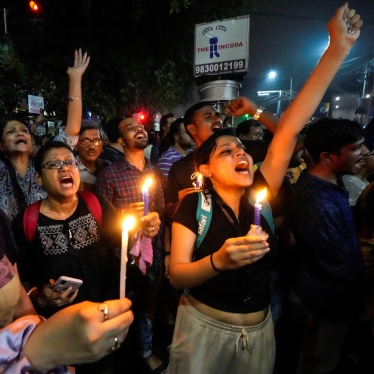(Mumbai) - Former U.S. President Bill Clinton, now visiting Asia as the United Nations’ special envoy on tsunami recovery, should speak out against reconstruction efforts that foster discrimination against vulnerable groups, in particular women and lower-caste people, Human Rights Watch said today.
Clinton is in India this week to survey post-tsunami reconstruction efforts in India’s southeastern coastal areas, particularly the hard-hit state of Tamil Nadu, which were battered by the Indian Ocean tsunami. The tsunami affected more than 2.7 million people in India, killed more than 10,000 and displaced nearly 650,000 others.
In a 47-page report released today, After the Deluge: India’s Reconstruction Following the 2004 Tsunami, Human Rights Watch examines the Indian government’s response to the tsunami and documents several systemic and potentially enduring failures. Human Rights Watch applauded the Indian government’s overall response to the tsunami, but found that government recovery efforts did not adequately take into account the needs of different vulnerable segments of the affected population, particularly women, children, the disabled, Dalits (so-called untouchables) and tribal groups.
“The slogan of tsunami recovery efforts throughout Asia has been ‘Build back better,’” said Brad Adams, Asia director for Human Rights Watch. “Bill Clinton should urge the Indian government to build in human rights protections that are better than what existed before.”
In India, the tsunami most seriously affected coastal communities of fishermen, who suffered the most casualties and the greatest loss of livelihood. But hundreds of thousands of others, such as farmers who lost their crops, also suffered serious loss. Craftsmen, laborers, traders and others who provide commercial services to the fishing communities were also indirectly, but greatly, affected.
In a May 10 letter to Clinton, Human Rights Watch explained its concerns about the reconstruction effort in tsunami-affected areas in three countries on his itinerary: India, Sri Lanka and Indonesia. In addition to country-specific issues, the letter set forth two general problems observed by Human Rights Watch researchers during recovery and reconstruction efforts: Historically marginalized groups suffered discrimination, and government relief efforts failed to adequately consult with local communities about relocation and compensation for loss of livelihood and property.
“Whether it’s higher-caste groups and developers in India, or the military and armed groups in Indonesia and Sri Lanka, the powerful have tried to take advantage of the scramble for rebuilding and recovery at the expense of the basic rights of vulnerable groups,” said Adams.
In India, particularly in the weeks right after the tsunami, Human Rights Watch documented discrimination against Dalits by other victims of the tsunami, who belonged to a higher caste. In many instances, the Indian government failed to enforce its existing legislation and policy to protect vulnerable groups. Human Rights Watch urged the Indian government to undertake effective training and education—both for officials and the affected communities—part of its disaster management strategy.
Human Rights Watch also urged the Indian government to take steps to ensure that its proposed compensation and relocation schemes do not overlook tens of thousands of people who cannot easily document their economic and property claims. In particular, the most marginalized communities—those without effective local or political clout—are at risk of being ignored.
“India did not need international assistance for immediate relief but, in fact, dispatched help to its neighbors,” Adams said. “But to be an effective model for other countries, India has to demonstrate greater protection of the human rights of its own citizens.”
The report offered a set of recommendations to the Indian government, state and district administrations, voluntary groups and donor agencies take the following steps:
- improve public education and law enforcement efforts to better combat caste-based discriminatory practices and fully implement the provisions of the Scheduled Castes and Scheduled Tribes (Prevention of Atrocities) Act, 1989 and the Scheduled Castes and Scheduled Tribes (Prevention of Atrocities) Rules, 1995;
- seek to restore a sustainable livelihood for all communities of fishermen by ensuring that fishermen have adequate access to the coastline, and have proper boats and implements necessary to resume their trade;
- seek to restore a sustainable livelihood for communities indirectly affected by the tsunami; such measures include creating compensation mechanisms that account for non-tangible assets, and providing alternate employment for daily wage laborers in local reconstruction efforts;
- provide equitable distribution of resources without caste, gender, or religious prejudice;
- provide adequate measures to meet the protection needs of women, children and the disabled;
- engage in consultations with local communities to prevent arbitrary or discriminatory relocation or any unreasonable denial of the option to return home; and
- encourage cooperation among government officials, nongovernmental organizations and donor agencies to prevent uneven or inefficient distribution of resources.





